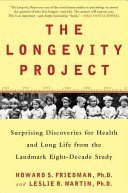 The Longevity Project: Surprising Discoveries for Health and Long Life from the Landmark Eight-Decade Study, by Howard S. Friedman and Leslie R. Martin (Hudson Street Press, New York, 2011)
The Longevity Project: Surprising Discoveries for Health and Long Life from the Landmark Eight-Decade Study, by Howard S. Friedman and Leslie R. Martin (Hudson Street Press, New York, 2011)
In the early part of the last century, Dr. Lewis Terman began a long-term study of children identified by their teachers as particularly gifted academically. Although Terman was interested in intelligence and intellectual leadership, his study left behind a great collection of sociological data, which Friedman, Martin, and their colleagues have mined for information on the factors that predispose human beings to long and productive lives.
The authors expound at length on why the data and their studies are valid, and the results applicable to most people, not just intellectual geniuses. And the results—no surprise—are much more complicated than conventional wisdom would lead one to believe. So interesting and complex are the relationships that it would be an insult to the researchers to attempt to distill their findings in a simple review. But I will note a few items of interest.
- Conventional wisdom often confuses correlation with causation. For example, although it is commonly believed that happiness promotes good health, and vice versa, the relationship is not in either direction cause-and-effect. Rather, the same underlying factors promote both happiness and health.
- The best personality predictor of longevity—as children and as adults—was what the authors call conscientiousness: people who were prudent, persistent, dependable, thrifty, detail-oriented, and responsible.
It is not only that conscientious people have better health habits and healthier brains, but also that they find their way to happier marriages, better friendships, and healthier work situations. That’s right, conscientious people create healthy long-life pathways for themselves.
-
Another key factor is social network, but as usual, it’s more complicated than simple sociability. Being an extrovert, having many friends, and abundant social activity do not presage a long life. Sociability itself, the authors say, is “a wash.” An active social life is a two-edged sword; how it cuts depends on the quality of the friends and of the activities.
Social ties, however, are critical: having a large support network is directly correlated with longer life. Interestingly, feeling loved and cared for did not improve longevity, but helping and caring for others did.
(More)
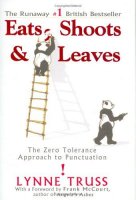 Eats, Shoots & Leaves: The Zero Tolerance Approach to Punctuation, by Lynne Truss (Gotham Books, New York, 2003)
Eats, Shoots & Leaves: The Zero Tolerance Approach to Punctuation, by Lynne Truss (Gotham Books, New York, 2003)
A panda walks into a café. He orders a sandwich, eats it, then draws a gun and fires two shots in the air.
“Why?” asks the confused waiter, as the panda makes towards the exit. The panda produces a badly punctuated wildlife manual and tosses it over his shoulder.
I’m a panda,” he says, at the door. “Look it up.”
The waiter turns to the relevant entry and, sure enough, finds an explanation.
“Panda. Large black-and-white bear-like mammal, native to China. Eats, shoots and leaves.”
Many thanks to DSTB for giving me this book, and thereby redeeming a past mistake on my part, made in response to a mistake on the part of our library.
I’d heard that Eats, Shoots & Leaves was a good book—though I knew little about it, as you will see—and so one day when I found it on tape at our library, I checked it out. I obviously was not paying attention when I put the cassette in our player, because apparently the wrong tape had been returned to the Eats, Shoots & Leaves packaging. What I heard was so uninteresting to me that I didn’t even finish the book, and don’t remember it now; it certainly wasn’t about punctuation.
“What?” you ask. “There’s something more boring than punctuation?”
Read Eats, Shoots & Leaves. You’ll never call punctuation boring again. You’ll laugh, and you’ll also learn.
One thing I learned is something I’ve suspected for a while now: the rules change when you cross the Atlantic. It’s not just the spelling (and pronunciation) of that metal out of which we make soda cans and “tin” foil. Truss encourages us to be sticklers for proper punctuation (hear, hear!)—a difficult enough task when bad examples surround us—but also cautions that sometimes what looks incorrect may be merely a cultural difference.
Be that as it may, the only thing that annoyed me about this short and pleasant book—and only as much as fingernails on a blackboard—was this British author’s persistent use of the British way of combining punctuation and quotation marks.
Many words require hyphens to avoid ambiguity: words such as “co-respondent”, “re-formed”, “re-mark”.
I would have called that plain wrong, but it turns out that putting the punctuation inside the quotation marks (<ahem> where it belongs!) is an Americanism.
Many words require hyphens to avoid ambiguity: words such as “co-respondent,” “re-formed,” “re-mark.”
I see the logic of the British system, but it still grates.
I also learned that there’s a reason for another annoyance ; this one is found in my beloved collection of George MacDonald books : What ? Colons, semicolons, question marks, and exclamation points ! find themselves preceded as well as followed by spaces. Truss provided the answer to my puzzlement: these books are facsimile editions, and that now strange punctuation procedure was at one time the Way Things Are Done.
Are you confused by the Way Things Are (or Should Be) Done Now? Check out Eats, Shoots & Leaves for some seriously amusing enlightenment.
A headline recently provided by my Google News feed illustrates the importance of correct punctuation.
Ratko Mladic arrested, Hillary Clinton in Pakistan
Imagine it now, without the comma:
Ratko Mladic arrested Hillary Clinton in Pakistan
Punctuation matters. So read, mark, learn, and inwardly digest—and enjoy!
It had been a few years since our last visit to a concert of the Florida Symphony Youth Orchestra, and I couldn't help thinking throughout that I wish this had been the orchestra of Janet's experience. Orchestras, as well as people, can develop much in fifteen years!
After very creditable performances by the Overture Strings and Prelude Orchestras, the Philharmonia took the stage. Back in Janet's day, students looked forward to graduating from the Phil to the top orchestra, the Symphonic, in order to play the "real" version of major orchestral works rather than reduced arrangements; now the Philharmonic plays the full versions, also. They did a great job with Tchaikovsky's March Slave, Shostakovich's Festive Overture, and—my personal favorite of this concert—Carried Up in the Fields, by John Dupuis. John is now the conductor of the Phil, but in our day he was one of the FSYO's best flute players, and played with Janet in their wind quintet, Quintessence. (We knew him when....)
Best of all, though, John is a composer. I knew that when he was still a teenager, and the FSYO premièred his Atlantis. Universal Studios acknowledged the same by featuring an excerpt from Atlantis at the grand opening of their Islands of Adventure theme park. Here's a link so that you can hear Atlantis for yourself. The oboe solo always makes me tear up; you can guess who played it at the première. If you like that, check out more of John's works on his site.
Shostakovich was featured heavily on this program. After intermission, the Symphonic Orchestra took the stage, beginning with Concerto Competition winner Giancarlo Licitra, playing the first movement of the Shostakovich Cello Concerto No. 1. Their final piece was the fourth movement of Shostakovich's Symphony No. 5. In between they played another new work, LocoMotion by Stella Sung. I 've almost always liked Dr. Sung's music, and this was no exception.
Both the Philharmonic and Symphonic orchestras played excellently, and Giancarlo Licitra superbly.
But back to John Dupuis. After conducting, Carried Up in the Fields, John commented that even when he tries not to write movie music, it comes out sounding like movie music. I don't know how true that really is, but I say,
Go for it, John! Movie music is your destiny.
Back in 1999, after hearing Atlantis for the first time, I wrote in my journal, "Move over, John Williams and James Horner. (I don’t say Patrick Doyle yet, though!)"
Feel free to make me change my mind about Patrick Doyle.
I dislike shopping. (Those who know me, also know how understated that is, but "loathe" seems too strong a word to use about something so trivial.) On top of that, I have an aversion to adding "stuff" to our home. Until proven otherwise, if it takes up space, it's as welcome as an undocumented worker in Arizona.
It only took me a couple of years of waffling before opening the door to this immigrant, but it immediately proved itself a trustworthy and productive citizen: a Cuisenart hand blender.
Why buy a hand blender when you have a perfectly good regular blender already? That nagging question also postoned this purchase, but the answer soon became obvious: despite the similarity of their names, the two appliances serve different purposes, and the hand blender is far superior for making sauces, soups, and—our favorite—smoothies.
The blender itself takes up little space. (The accessories take up a bit more, and I actually haven't used them yet.) No more laborious transfer of hot sauce bit by bit from the pan to the blender: in a few seconds the hand blender delivers a smooth sauce right in the cooking pot. Throw some frozen berries, yoghurt, milk, orange juice concentrate, and almond flavoring (for example) into a quart measuring cup, whirl it around with the blender, and—voilá!—an easy, healthy smoothie. Best of all, the hand blender is an absolute snap to clean.
Okay, so I'm lazy. Is it that much trouble to use the regular blender for these things? Maybe it shouldn't be, but with the hand blender I actually do them. These days, I'm very much into arranging my life for success. Glenn Doman's philosophy, "We arrange for the child to win," works for adults, too. Our new hand blender has turned out to be an effective addition to that toolbox.
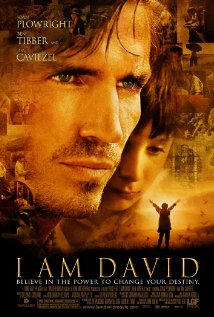 I Am David (2003, PG)
I Am David (2003, PG)
Six years ago, my sister-in-law informed me that one of my favorite books, Anne Holm’s North to Freedom, had been made into a movie called I Am David. Let this serve as an encouragement (?) to those who think I’ll never follow through on their recommendations: Last week, we finally saw the movie.
Let me get the standard litany out of the way: The movie isn’t nearly as good as the book. It takes the plot, the setting, and the characters, but loses most of what makes the book sublime. To be fair, translating David’s thoughts and transformations to film is probably impossible. This may explain why I rarely find watching a movie to be an exalting experience.
That said, I Am David is very much a worthwhile movie to see. It is the story of 12-year-old David’s escape from the only life he can remember: the Communist prison camp in which he was raised, primarily by a man named Johannes.
(Johannes, incidentally, is from the Alsace region of France, and in consequence David’s journey takes him through Basel, a fact that escaped me on previous readings of the book, since at the time Basel had no particular significance for me. That part is missing from the movie, however, so don’t be looking for shots of the Münster. In fact, all of the movie—with scenes in Bulgaria, Greece, Italy, Switzerland, and Denmark—was filmed in Bulgaria.)
Ben Tibber, who plays David, does a better job than many adult actors I’ve seen; his face got him the job, and he makes great use of it for wordless expression. Jim Caviezel plays Johannes so movingly that I wasn’t in the least surprised to learn that he also played Jesus in The Passion of the Christ.
The PG rating is because of some violent prison camp scenes, but the movie does a great job of suggesting the horror without being unnecessarily graphic. My primary complaint, other than the loss of the most important parts of the book, is that several of the movie’s characters are less pleasant than in the book—the Italian sailor demanding a bribe, rather than simply helping David, for example.
Naturally, I strongly suggest reading North to Freedom rather than watching the movie, but if you’re not going to read the book, I Am David would be a great addition to your video experience.
Daniel May: The Tall and the Small
Sibelius: Symphony No. 1
Tchaikovsky: Violin Concerto
Christopher Wilkins, conductor
Joshua Bell, violin
The first work on the program was a tribute to Jonathan May, onetime director of the Florida Symphony Youth Orchestra, who died unexpectedly last year. The Tall and the Small was composed by May's brother, and his wife, Maureen, played the solo cello parts. I was impressed that she was able to perform this without breaking down. The most exciting aspect of the piece, however, was that it was composed for double string orchestra, the "Tall" orchestra being the OPO, and the "Small" orchestra made up of student musicians. I'm sure that performing with the OPO was quite a thrill for them—not to mention sharing the program with Joshua Bell. At the risk of making some of my readers feel old, I'll mention that they had auditioned for the job via YouTube!
I like Sibelius, so perhaps if I were more familiar with his first symphony I would have enjoyed it more. As it was, I confess I found both pre-intermission works rather soporific. Looking around, it was apparent I was not the only one.
But only a terminal narcoleptic could have slept during the second half.
I've spoken before of my concern about the superstar phenomenon that destroys the "middle class" in music, sports, and many other fields. Yet there is no doubt that Bell's superstardom is deserved. As is that of the Stradivarius he plays. Never have I heard so many textures come from a single instrument. And what high notes! What harmonics! Years ago, when I asked one of Janet's violin teachers how he knew where to place his finger when leaping to the far reaches of the fingerboard, he replied, "You stab and hope." Bell stabs and knows. What's more, despite his appearing to have put in his 10,000 hours on this concerto alone, the performance conveyed an almost playful delight.
As an encore, he began with what sounded like a reprise of the magical cadenza from the first movement, but which quickly turned into a fiery cadenza for Yankee Doodle.
The full-house audience was appreciative and enthusiastic, with many unable to restrain themselves from a premature standing ovation after the first movement of the Tchaikovsky. I confess: I applauded, too. You just had to; it was that transcendent. Joshua Bell made the news four years ago for being decidedly under appreciated when he played the part of a street musician in a Washington, D.C. Metro station. As unobservant as I can be when focussed on the goal at hand, I like to think I could not have passed such music by without standing, transfixed and open-mouthed. Then again, I've always had a soft spot for street musicians.
Whatever it cost the OPO to bring Bell to Orlando, I'm glad they did. His performance of the Tchaikovsky was like a meal at the Cheval Blanc in Basel.
How can you take a book without one single battle scene and turn it into an action movie?
"How" is actually quite well answered by the makers of the most recent attempt to bring Narnia to Hollywood, The Voyage of the Dawn Treader. But what I really meant by the question was, "Why would you want to do so, and where do you get the audacity? If you want to tell a different story, why take someone else's character names and setting?"
But I've sung this same song a lot recently, most notably for The Lord of the Rings and the first two Narnia films, and it's getting wearisome. If I'm tired of movies that rip the heart and beauty out of a book and try to pass their new creation off as the real thing, then others are surely tired of me whining about it. Perhaps the action film, bratty teen, and self-esteem genres are the "heart language" of today, and the filmmakers should be commended for speaking to people in a language they can hear. Maybe the door will open a crack for what I see as the true beauty and wonder of the books. (More)
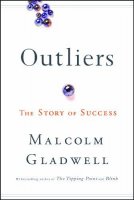 Outliers: The Story of Success, by Malcolm Gladwell (Little, Brown & Co., New York, 2008)
Outliers: The Story of Success, by Malcolm Gladwell (Little, Brown & Co., New York, 2008)
Malcolm Gladwell’s books always turn my mind upside down. He may not always be right, but he’s always exciting.
What makes a superstar? What differentiates Bill Gates from the average computer geek, the Beatles from a garage band, the top athletes from the wannabes? Talent, certainly, and hard work—but Outliers reveals that the most critical factors are often surprising, even random.
The 10,000 hour rule Talent, we generally believe, is something we are born with. Intelligence, musical ability, athletic skill: you either have it, or you don’t. There is more excuse than truth there, however. There is a threshold of talent required in any field, but beyond that, experience is the all-important key.
Practice isn’t the thing you do once you’re good. It’s the thing that makes you good.
Study after study has shown that it takes about 10,000 hours of practice to achieve world-class expertise in any field. That’s 2,000 hours per year—the equivalent of a full-time job—for five years. The opportunity to get those 10,000 hours, at the right place and time, makes superstars. For Bill Gates it was a series of unusual circumstances, beginning in middle school, that gave him access to computers that even most college students did not have. Before he dropped out of Harvard to make history, Gates had been programming for well over 10,000 hours.
Thanks to a chance encounter—and some illicit incentive—the Beatles found themselves in a set of gigs that required an extraordinarily long performance commitment: up to eight hours per night, seven days a week. It was the making of the group. By the time they came to America in 1964, they had some 1200 live performances under their guitar straps.
Or, as Shinichi Suzuki said, “Skill equals knowledge plus 10,000 times.” Another gem from the Suzuki world (though I’ve seen it attributed in several ways, most commonly to Vince Lombardi): Practice doesn’t make perfect. Only perfect practice makes perfect. Clearly one must put more into those 10,000 hours than just time. (More)
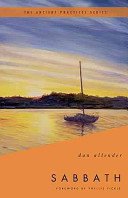 Sabbath, by Dan B. Allender (Thomas Nelson, Nashville, 2009)
Sabbath, by Dan B. Allender (Thomas Nelson, Nashville, 2009)
Mystical poets who enjoy attempting to express the inexpressible may find working through Allender's Sabbath a productive exercise, but those looking for a practical, rational discourse on how to honor the Sabbath Day will find themselves banging their heads in frustration. I know I did.
It's clear that Allender has experienced an otherworldly delight in his own celebration of the Sabbath; unfortunately, like many mystics of old, his attempts at sharing that experience fall flat. First, there is a language barrier. Poetical prose as a literary device can work, but like straight poetry it takes effort to make out the sense, and even then you're not sure you've got it right. When you're expecting an informative book, the attempt at poetic language quickly becomes annoying. (More)
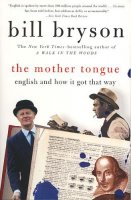
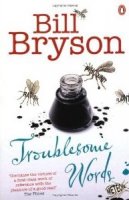
The Mother Tongue: English and How It Got that Way (first published 1991, reissued by Perennial 2001) and Troublesome Words (first published 1984, revised 1997, reissued by Penguin Books 2009), both by Bill Bryson
My father and my sister-in-law became hooked on Bill Bryson as a writer; perhaps it is now my turn.
For the first twelve chapters, The Mother Tongue is an accessible, page-turning look at the English language: where it came from, why it’s so popular, and how it came to be simultaneously one of the easiest and one of the hardest languages to learn. (More)
Music is such a personal, touchy subject—as is worship. Put them together and you might as well be mixing sulfur, charcoal, and saltpeter. Nonetheless I will boldly go where too many have gone before, in order to draw attention to “Pop Goes the Worship,” an interview in Christianity Today (March 2011) with T. David Gordon, author of Why Johnny Can’t Sing Hymns: How Pop Culture Rewrote the Hymnal.
I wasn’t expecting much when I began the article (who writes these titles, anyway?), but was quickly drawn in. A sure way to my heart is to say what I’ve been saying myself, or wanted to say, only much better and with authority. The article is worthwhile in its entirety; here are a few excerpts to whet your appetite—or raise your blood pressure. [Emphasis in the following is mine]
T. David Gordon argues that modern worship choruses have trumped hymns in many congregations because for decades, we have been inundated with pop music—to the point that many of us don't know better. If you eat nothing but Big Macs, Gordon says, you will never appreciate a filet mignon.
Regarding church music, Gordon says, media ecologists should ask how music, "once a participatory thing, became a passive thing. What happens when people who used to sing folk music around the house are now surrounded by Muzak? How does that alter our sensibilities of music?"
Many are promoting an "aesthetic" that it is our duty to patronize living artists and not artists who are dead. Should we also not read books that are more than 50 years old, or enter buildings that are more than 50 years old? Christians aren't abandoning their buildings, and they haven't stopped reading Spurgeon or Edwards or Luther or Calvin. We haven't rejected other art forms that are not new. We've done so only with music.
Unless an individual chooses to listen to different kinds of music, the only thing that individual will hear (most of the time) is pop. Sure, one's sensibilities can be shaped deliberately, and many of us have developed tastes that we once did not have. (I spent years cultivating a taste for Brahms, whom I now love, and I spent about two years cultivating my appreciation for jazz.) If I did not believe that sensibilities could be cultivated, I wouldn't have written the book; it is, in some senses, a plea to shape them differently from the way commercial pop culture shapes them. But for people who do not take ownership of the cultivation of their sensibilities, other cultural gatekeepers will shape them for them—and in this case, they will shape them to prefer pop.
Piazzolla: Tangazo
Mozart: Sinfonia concertante in E-flat major, K. 297b
Tchaikovsky: Symphony No. 4 in F minor, op.36
Alondra de la Parra, conductor
Nikolay Blagov, clarinet
Jamie Strefeler, oboe
Diane Bishop, bassoon
Mark Fischer, French horn
Alondra de la Parra. Thirty years old, and already an exciting conductor. Watch out for her. Seek out her performances.
As OPO supporters, we are invited to attend one of the open Friday night rehearsals before a concert, and we chose this one for the compelling reason that it was the only one scheduled for when Porter was able to attend. What a fortunate Hobson's choice!
Back when Janet was in the Florida Symphony Youth Orchestra, we enjoyed listening to rehearsals because the orchestra would play, the conductor would make some suggestions, and then the orchestra would play again—with obvious improvement. Orlando Phil rehearsals are not usually fun in that way, because, of course, they are better players.
And then Alondra de la Parra came as guest conductor. I don’t know how the musicians felt, being treated like youth orchestra students—for Maestra De la Parra stopped them, and worked them, and even at one point had them play to the accompaniment of a loud and disconcerting rim-tap metronome sound from the percussion section. She made them play chords again and again, until she heard the right balance: “I need more of the C!” She ran late, much to the annoyance of the union rep, who checked his watch every minute and a half.
But what a difference the work made! The before and after contrast was as discernable as it had been with the students, and the next day's performance was even more brilliant. I have always loved the OPO, but I had no idea they could play like that. I loathe the “grade inflation” that has led to standing ovations at nearly every concert, but this time I was one of the first on my feet.
De la Parra is fun to watch, too. With the baton she is as commanding as a four-star general, and yet she dances her directions, playing the orchestra like a beloved instrument, coaxing out the sound.
She gave most of her rehearsal attention to the Tchaikovsky, and it was consequently the most stunning. But the Mozart was delightful because of the players: Jamie Strefeler handled the oboe part with skill, Mark Fischer is always good on horn, Nikolay Blagov would make even Heather like the clarinet, and Diane Bishop’s bassoon playing amazes me every time. (To be completely honest, my favorite part of the Tchaikovsky was some exquisite solo bassoon notes.)
The Piazolla was fun, all the more so because we recognized both the name and the style from a concert in Japan a few years ago. There we had heard his Libertango played by a talented cellist, who, like other notables such as Diane Bishop and Janet Stücklin-Wightman, graduated from the Eastman School of Music. She is now teaching at an arts school in Africa. This completes your It’s a Large World trivia diversion for today.
We capped the evening by enjoying some drinks (okay, it was water) and cookies (oatmeal) at a table by a fountain, while the rest of the crowd struggled to get out of the parking lot. Twenty minutes later the way was clear; we packed up our belongings and drove home in peace.
The Olde Cup & Saucer, Jamestown Place, Altamonte Springs, Florida
This is for our friend, Nancy: I'm taking you to tea at The Olde Cup & Saucer. All you have to do is figure out how to get here from North Carolina.
It's a pity the Olde Cup & Saucer is in a storefront rather than a garden setting, but if you sit with your back to the window and ignore the fact that you can read the menu, you can at least imagine you're sitting in a European café. Better, because no one's smoking.
The restaurant serves lunch and afternoon tea; we went for the former, and will be back to check out the latter. There's a good assortment of teas available, though we chose the specials of the day for the cheaper price and free refills. True, even $1.25 is a lot to pay when we have a store of many excellent teas at home, but hey, I once spent four Swiss francs for a cup of tea in Bern. (As that cup came with shelter from a storm, as well as a cookie, the price was not too high.)
It was a good Irish Breakfast, served in a lovely cup that brought instantly to mind the above-mentioned friend. (Porter enjoyed the Arctic Raspberry, iced.) From the lunch menu, I chose the Classic, with a cup of the soup of the day and two tea sandwiches. The cheddar cheese and bacon soup was served as hot as I like it, which is rare in restaurants, and I could have happily eaten a large bowl. For the sandwiches I chose curry chicken salad, and spinach. They were out of the spinach, so I substituted cucumber. Both were delicious and creatively presented. Porter couldn't resist the dish named for our mutual ancestor, Henry II: shrimp salad, and a side of hearts of palm with Vidalia dressing. Again, the food was creative and delicious: the shrimp salad included, among other, less-identifiable treats, walnuts and olives. Quantities were decidedly un-American, a "tea sandwich" being the size of half of what I'd call a sandwich, and thus even smaller than normal restaurant fare. But it was enough, just right. Smaller portions lend themselves better to savoring.
The Olde Cup & Saucer also sells a modest selection of loose teas; my only disappointment was discovering that what they call Russian Caravan is noticeably smoky, unlike the other teas I've had under that name. Ah, well—we know people who pass through the Basel train station now and then....
Although I generally prefer to have people come to our house to share meals, sometimes folks would rather meet at a restaurant. I'm confident enough in my cooking not to let this bother me (much), but heretofore I've not had a suggestion to make when asked, "Where would you like to meet?" Now I can't wait for the next opportunity.
 When will I learn not to trust product labels? I tasted these delightful cocoa almonds at the Daleys' and didn't resist when our local Publix had them on a buy one, get one free sale. They were just as good as I had remembered, and Porter agrees with my assessment.
When will I learn not to trust product labels? I tasted these delightful cocoa almonds at the Daleys' and didn't resist when our local Publix had them on a buy one, get one free sale. They were just as good as I had remembered, and Porter agrees with my assessment.
The problem? Hidden away at the bottom of the ingredient list—which otherwise is agreeably small, for a snack food—is that hateful word, "Sucralose."
Now, I'm not opposed to artificial sweeteners for those who want to use them. Xylitol, for example, is an important part of my dental care, and I don't want any well-intentioned busybodies trying to ban it.
But I'm also in favor of full disclosure when it comes to food products, and hiding artificial sweetener behind small print is cheating. One ought to be able to assume that a product is sweetened naturally unless otherwise clearly informed. They could at least have used the same upper case letters that boldly inform me that this product "CONTAINS ALMONDS." Really? A product named "Cocoa Roast Almonds" contains almonds? What is the world coming to?
How did you celebrate St. Patrick's Day? We braved the crowds and streets awash in green beer to see Freud's Last Session at our favorite Mad Cow Theatre. Once again I must be grateful to my husband who drags me to such things when I'd rather stay at home because my revision of Phoebe's Quilt is bumping up against its April deadline with an unthinkable* amount of work still remaining.
There are perhaps a thousand wrong ways to craft a play about a hypothetical meeting between Sigmund Freud and C. S. Lewis, but playwright Mark St. Germain achieved the impossible: a show that is intellectually honest, fair, and respectful of both the character and the viewpoints of each man. Similar respect, fairness, and honesty shone through the performances of Steven Lane (Lewis) and Terry Wells (Freud) under the direction of Mad Cow's Rick Stanley. As it turns out, St. Germain's inspiration was Harvard professor Dr. Armand Nicholi's The Question of God, so if I'd only remembered my own blog post from six years ago, I wouldn't have been so surprised at the excellence.
After the performance we had a chance to ask questions of the director and the actors, and if there was one overwhelming impression I took home from the audience's response was their appreciation, tinged with astonishment, of an example of two people with strong, heartfelt, and opposing ideas engaging in discourse that is both substantive and respectful. In truth, I was a bit shaken to realize that ordinary civility has become a thing at which to marvel.
You can see excerpts from the play at the official New York site. I have to say that I liked the work of Lane and Wells better, though it's not fair to judge based on small clips.
Oh, and what does this have to do with St. Patrick's Day? Well, C. S. Lewis was born in Ireland. Not that St. Patrick himself was....


